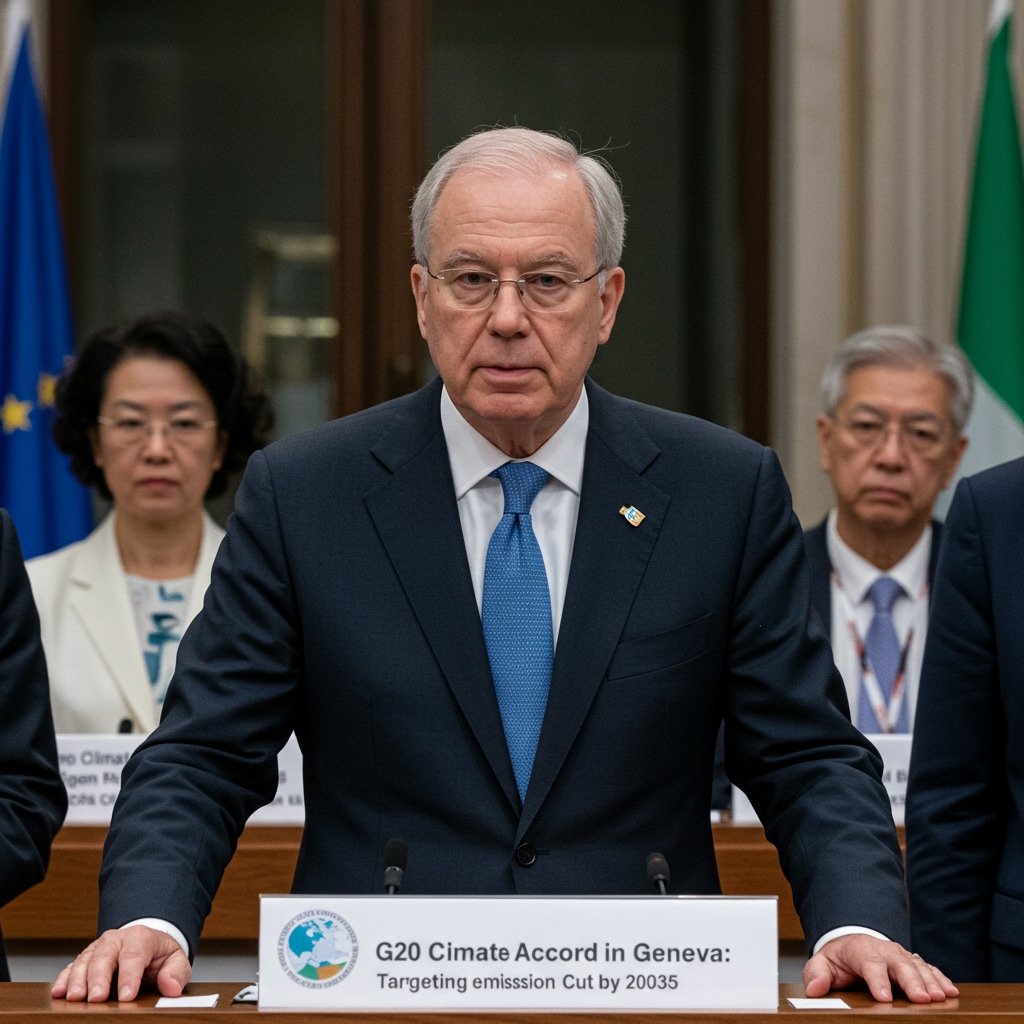G20 Nations Forge Landmark Climate Agreement in Geneva
Geneva, Switzerland – In a pivotal moment for global climate action, representatives from the Group of Twenty (G20) nations today formally finalized and signed the Landmark Global Climate Accord during a high-level summit held in Geneva. This comprehensive agreement represents a significant collaborative effort by the world’s major economies to accelerate the fight against climate change, setting ambitious, binding targets for emissions reduction and providing substantial financial support for developing countries.
The accord, the culmination of months of intense negotiations and diplomatic efforts, commits its signatories – representing approximately 80% of the world’s GDP and two-thirds of the global population – to an average reduction of greenhouse gas emissions by 40% from 2005 levels by the year 2035. This target is more aggressive than previous collective commitments and is seen by many as essential to keeping the goal of limiting global warming to 1.5 degrees Celsius above pre-industrial levels within reach.
Key Provisions and Binding Targets
The Global Climate Accord is structured around several core pillars designed to drive tangible progress. A central element is the inclusion of binding targets for renewable energy adoption. Each signatory nation has committed to specific, nationally determined contributions (NDCs) for increasing the share of renewables in their energy mix, alongside the overarching emissions reduction goal. These targets are intended to spur massive investment in solar, wind, geothermal, and other clean energy technologies, facilitating a faster transition away from fossil fuels.
Beyond renewable energy, the accord also outlines enhanced commitments to improving energy efficiency across various sectors, promoting sustainable land use, and investing in carbon capture and storage technologies where appropriate. The binding nature of these commitments marks a notable shift from previous international climate frameworks, providing greater accountability and predictability for long-term planning and investment.
Financial Support and Implementation Mechanism
Recognizing the disparate capacities and historical contributions to emissions among nations, a critical component of the agreement is the establishment of a $100 billion fund. This fund is specifically designated to support developing nations’ transition to green technologies and build resilience against the impacts of climate change. The financial mechanism aims to address concerns about equity and ensure that the global shift to a low-carbon economy is inclusive and does not disproportionately burden vulnerable countries.
The administration and oversight of the $100 billion fund, as well as the monitoring of overall accord compliance, will be managed by a newly formed international oversight committee. This committee, composed of representatives from signatory nations and international climate experts, will be responsible for reviewing national progress reports, verifying emissions data, facilitating technology transfer, and ensuring the transparent allocation of financial resources. Its mandate includes developing detailed guidelines for how the fund’s resources will be accessed and utilized by developing countries to maximum effect.
Path to 1.5°C and Future Outlook
The stated primary objective of the Global Climate Accord is to significantly accelerate global efforts towards limiting the rise in global average temperature to 1.5 degrees Celsius above pre-industrial levels. Scientists widely regard this threshold as critical for avoiding the most catastrophic impacts of climate change. The 40% average reduction target by 2035 is calculated based on scientific consensus regarding the emissions trajectory required to stay on track with this ambitious limit.
While the signing of the accord in Geneva is being hailed as a major diplomatic achievement, the real test lies in its implementation. The coming years will require unprecedented cooperation, innovation, and investment from all signatory nations. Experts note that achieving the 40% reduction target will necessitate fundamental transformations in energy systems, industrial processes, transportation, and agriculture globally.
The establishment of the international oversight committee is seen as crucial for maintaining momentum and ensuring accountability. Regular reporting mechanisms and review cycles are expected to be put in place to track progress and identify areas where additional support or stronger measures may be needed. The accord also includes provisions for periodic review and potential strengthening of targets based on evolving scientific understanding and technological advancements.
The Geneva agreement sends a strong signal that the world’s leading economies are committed to a collective, ambitious path towards decarbonization. Its success will ultimately depend on the sustained political will and coordinated action of the G20 nations and the broader international community.





